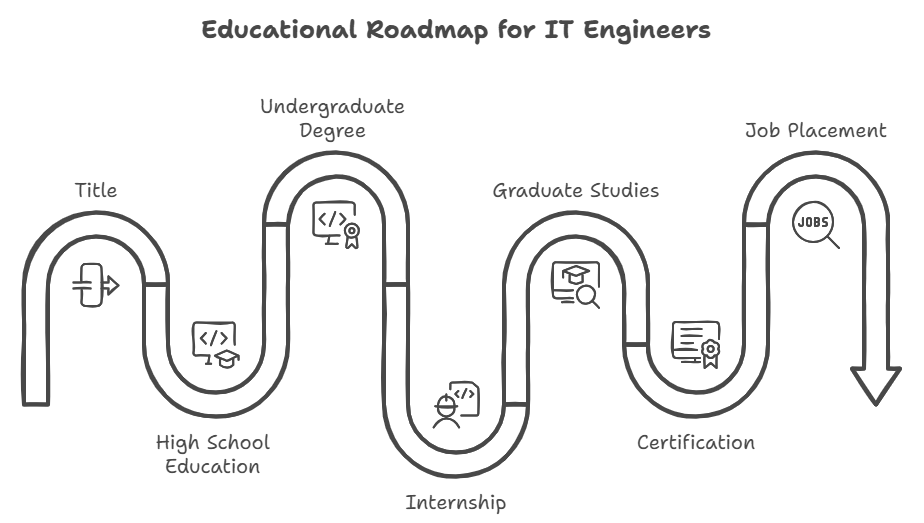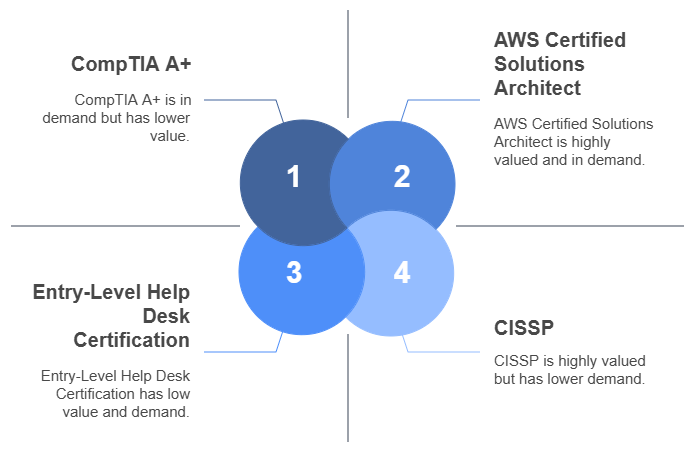
- Who is an IT Engineer?
- Required Educational Background
- Core Technical Skills
- Certifications to Consider
- Gaining Practical Experience
- Building a Portfolio
- Internships and Entry Roles
- Networking in the Industry
Who is an IT Engineer?
An Information Technology (IT) Engineer is a skilled professional who plays a pivotal role in the planning, development, implementation, and maintenance of an organization’s technology systems. Their primary responsibility is to ensure that all computer systems, networks, and digital infrastructures operate efficiently, securely, and without interruption. These engineers are the backbone of modern businesses, ensuring that technology aligns with operational goals and supports productivity. IT engineers often specialize in specific areas such as systems administration, where they manage servers and ensure system uptime; network engineering, where they design and maintain communication networks; cybersecurity, where they protect data from unauthorized access and cyber threats; software development, where they create and maintain custom applications; and database management, where they ensure the integrity and accessibility of data, skills frequently developed in Web Designing Training. In addition to their technical skills, IT engineers must be adept problem solvers, capable of troubleshooting hardware and software issues quickly. They collaborate with other IT professionals, such as support technicians and analysts, to resolve system failures, implement updates, and improve performance. Strong communication skills are also essential, as IT engineers often translate complex technical problems into understandable solutions for non-technical stakeholders. Given the rapid evolution of technology, IT engineers must continuously update their knowledge and adapt to new tools, platforms, and best practices. Their work is critical to supporting digital transformation, enabling innovation, and maintaining the competitive edge of organizations in virtually every industry. In summary, IT engineers are essential in today’s digital age, ensuring that businesses can operate smoothly, securely, and efficiently through the strategic use of technology.
Do You Want to Learn More About Web Developer? Get Info From Our Web Developer Courses Today!
Required Educational Background
The required educational background for an Information Technology (IT) Engineer typically begins with a bachelor’s degree in a relevant field such as Information Technology, Computer Science, Computer Engineering, or a closely related discipline. This foundational education provides students with essential knowledge in programming, networking, systems analysis, databases, and software development. Coursework often includes both theoretical concepts and hands-on training, equipping students with the skills needed to understand and manage modern IT infrastructures. In addition to formal education, many IT engineers choose to pursue specialized certifications to enhance their expertise and career prospects, especially in areas like AngularJS CDN Integration. Common certifications include CompTIA A+ (for general IT knowledge), Cisco Certified Network Associate (CCNA), Microsoft Certified Solutions Expert (MCSE), AWS Certified Solutions Architect, and Certified Information Systems Security Professional (CISSP). These certifications validate specific skills and show employers a candidate’s commitment to continuous learning and professional development. Some positions, especially in advanced areas like cybersecurity, cloud architecture, or systems engineering, may require a master’s degree or significant experience in the field. A postgraduate degree can provide deeper insights into specialized areas and offer an edge in highly competitive roles.

Practical experience, such as internships or cooperative education programs, is also highly valued. These opportunities allow students to apply their academic knowledge in real-world settings and gain a better understanding of industry demands. Overall, a combination of formal education, relevant certifications, and practical experience forms a strong foundation for a successful career in IT engineering, helping professionals adapt to the constantly evolving technological landscape.
Core Technical Skills
- Programming and Scripting: Proficiency in programming languages such as Python, Java, C++, or scripting languages like JavaScript and Bash is fundamental. These skills allow IT engineers to automate tasks, develop software, and troubleshoot system issues effectively.
- Networking Knowledge: Understanding network concepts, protocols (TCP/IP, DNS, HTTP), and devices like routers and switches is essential. IT engineers must configure, manage, and secure networks to ensure reliable communication within and outside organizations.
- Operating Systems: Familiarity with multiple operating systems Windows, Linux, macOS—is critical. IT engineers should be comfortable managing OS installation, configuration, updates, and troubleshooting across different platforms, skills that can influence the Front End Developer Salary in India.
- Database Management: Knowledge of database systems such as MySQL, Oracle, or MongoDB enables engineers to store, retrieve, and manage data efficiently. Skills in writing queries, designing schemas, and ensuring data integrity are highly valuable.
- Cybersecurity Fundamentals: With increasing cyber threats, IT engineers must understand security principles, including firewalls, encryption, access control, and vulnerability assessment. Implementing security measures protects organizational assets and data.
- Cloud Computing: Experience with cloud platforms like AWS, Microsoft Azure, or Google Cloud is increasingly important. IT engineers leverage cloud services for scalable infrastructure, storage, and application deployment.
- Troubleshooting and Problem-Solving: Strong analytical skills are necessary to diagnose and resolve hardware, software, and network problems quickly. Being methodical and resourceful helps minimize downtime and maintain system reliability.
- CompTIA A+: This entry-level certification is ideal for beginners in IT. It covers fundamental concepts like hardware, software, operating systems, networking basics, and troubleshooting. It’s widely recognized as a starting point for IT professionals.
- Cisco Certified Network Associate (CCNA): The CCNA certification focuses on networking skills, including routing, switching, and network security. It’s essential for IT engineers working with Cisco equipment or managing network infrastructure.
- Microsoft Certified: Azure Fundamentals: This certification introduces basic cloud computing concepts and Microsoft Azure services, foundational topics sometimes covered in Web Designing Training.
- AWS Certified Solutions Architect Associate: This credential validates skills in designing and deploying scalable applications on Amazon Web Services (AWS). It’s valuable for IT professionals involved in cloud architecture and management.
- Certified Information Systems Security Professional (CISSP): CISSP is a highly regarded certification in cybersecurity, covering topics like risk management, access control, and cryptography. It is suitable for IT engineers aiming to specialize in security roles.
- CompTIA Network+: This certification builds on basic networking knowledge and covers network troubleshooting, operations, and infrastructure. It’s perfect for IT engineers wanting to deepen their networking expertise.
- Certified Ethical Hacker (CEH): CEH certifies skills in ethical hacking and penetration testing. It teaches how to identify and fix security vulnerabilities, making it ideal for those interested in cybersecurity.
- Showcase Practical Projects: Include real-world projects you have worked on, such as network setups, software applications, or system configurations. Detailed descriptions and outcomes demonstrate your hands-on experience and technical skills.
- Include Open Source Contributions: Participating in open-source projects highlights your collaboration skills and ability to contribute to larger development efforts. It also reflects your commitment to continuous learning and community involvement.
- Highlight Certifications and Training: Display your relevant certifications and completed training programs, including Web Designing Training and knowledge of the Top 10 Python Libraries for Machine Learning. These credentials validate your expertise and dedication to professional growth.
- Demonstrate Problem-Solving Abilities: Provide examples of challenges you encountered and how you resolved them. This shows your analytical skills and ability to handle real IT issues effectively.
- Use a Clear and Organized Format: Structure your portfolio logically, using sections for projects, skills, certifications, and work experience. A well-organized portfolio makes it easier for employers to assess your qualifications quickly.
- Incorporate Code Samples and Documentation: Include snippets of code, scripts, or configuration files along with documentation. This offers concrete proof of your technical abilities and attention to detail.
- Keep It Updated and Accessible: Regularly update your portfolio with new projects, skills, and achievements. Hosting it online using platforms like GitHub, personal websites, or LinkedIn ensures easy access for potential employers.
To Earn Your Web Developer Certification, Gain Insights From Leading Data Science Experts And Advance Your Career With ACTE’s Web Developer Courses Today!
Certifications to Consider

Gaining Practical Experience
Gaining practical experience is a crucial step for aspiring IT engineers, as it bridges the gap between theoretical knowledge and real-world application. While academic studies provide the foundational understanding of computing concepts, hands-on experience allows individuals to apply those concepts in dynamic, real-life environments. Practical experience not only strengthens technical skills but also develops problem-solving abilities, teamwork, and adaptability qualities highly valued in the IT industry. One of the most common ways to gain experience is through internships. Many companies offer internship programs for students or recent graduates, providing opportunities to work alongside experienced IT professionals. Internships expose individuals to actual business environments, where they can participate in tasks such as system maintenance, software development, network troubleshooting, and technical support, helping them understand practical issues like What are Python KeyError Exceptions. Another effective method is working on personal or open-source projects. By contributing to open-source communities or building their own applications and systems, aspiring IT engineers can demonstrate initiative and practical skill. These projects also serve as valuable portfolio pieces when applying for jobs. Additionally, part-time jobs, freelance opportunities, and volunteering for nonprofit organizations can offer hands-on exposure to IT work. Many educational institutions also include lab sessions and cooperative education programs (co-ops) in their curriculum, which are designed to simulate real-world technical challenges. Certifications that involve practical labs or simulation-based exams also contribute to applied learning. Ultimately, gaining practical experience allows IT engineers to become more confident, job-ready, and attractive to potential employers, making it an essential component of professional development in the tech field.
To Explore Web Developer in Depth, Check Out Our Comprehensive Web Developer Courses To Gain Insights From Our Experts!
Building a Portfolio
Internships and Entry Roles
Internships and entry-level roles are vital stepping stones for individuals starting their careers as IT engineers. These opportunities provide hands-on experience, enabling newcomers to apply theoretical knowledge gained through education in practical settings. Internships, typically offered to students or recent graduates, allow participants to work within IT departments under the guidance of experienced professionals. During internships, individuals might assist with tasks such as network setup, software troubleshooting, system monitoring, or technical support. This exposure helps interns understand workplace dynamics, develop technical skills, and build professional networks. Entry-level roles, such as junior system administrator, help desk technician, or network support specialist, offer a formal pathway into the IT industry, often requiring knowledge of key Web Development Languages To Learn. These positions often involve routine maintenance, user support, and assisting senior engineers with larger projects. Working in these roles helps new IT engineers gain valuable insight into organizational IT operations, problem-solving techniques, and customer service skills. Both internships and entry-level jobs emphasize the importance of continuous learning, adaptability, and teamwork. They also provide a chance to become familiar with industry-standard tools, software, and best practices. Employers often view candidates with practical experience more favorably, making these roles essential for building a strong resume. Furthermore, these positions can lead to permanent employment opportunities or promotions within the company, offering a clear career progression path. By starting with internships and entry-level roles, aspiring IT engineers develop the foundation necessary to handle more complex responsibilities and advance toward specialized or senior positions in the technology field.
Networking in the Industry
Networking in the IT industry is a crucial aspect of career growth and professional development for IT engineers. Building a strong network of contacts can open doors to new job opportunities, collaborations, mentorship, and knowledge sharing. Given the rapidly evolving nature of technology, staying connected with industry peers helps professionals keep up with the latest trends, tools, and best practices. Effective networking begins with attending industry events such as conferences, seminars, workshops, and meetups. These gatherings provide platforms to meet other IT professionals, learn from experts, and exchange ideas. Many organizations and professional groups also offer local chapters or online communities, which facilitate ongoing interaction and support. Social media platforms like LinkedIn have become essential tools for professional networking in IT, topics often emphasized in Web Designing Training. By maintaining an updated profile, sharing insights, and engaging with industry-related content, IT engineers can increase their visibility and connect with recruiters, potential employers, and collaborators globally. Networking is not just about expanding contacts but also about building meaningful relationships. Seeking mentorship from experienced professionals can provide valuable guidance, career advice, and encouragement. Similarly, collaborating on projects or contributing to open-source communities can strengthen professional ties and enhance one’s reputation. For IT engineers, networking also means learning from diverse perspectives, which fosters innovation and problem-solving. By actively participating in the IT community, professionals can access hidden job markets, gain insights into company cultures, and find opportunities for career advancement. In summary, networking in the IT industry is an ongoing process that plays a key role in personal growth, professional success, and staying competitive in a fast-paced technological landscape.





